Introduction to Programming with C++ For Engineers, Book Review -- Bartlomiej Filipek
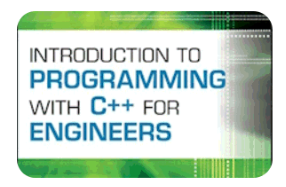 Lots of practical examples, general programming, software development techniques, OOP, parallel algorithms, plus C++ to combine it all into working applications. This is a short introduction to the book “Introduction to Programming with C++” by Prof. Boguslaw Cyganek, an excellent book for students who start their journey with system coding.
Lots of practical examples, general programming, software development techniques, OOP, parallel algorithms, plus C++ to combine it all into working applications. This is a short introduction to the book “Introduction to Programming with C++” by Prof. Boguslaw Cyganek, an excellent book for students who start their journey with system coding.
Introduction to Programming with C++ For Engineers, Book Review
By Bartlomiej Filipek
From the review:
“I have been highly impressed by Introduction to Programming with C++ for Engineers and can’t recommend it enough. With its content designed keeping in mind the author’s own students, the book assumes no prior programming experience, making it an excellent choice for anyone who wishes to learn C++ as their first programming language. […]
The book extends its reach beyond just the programming language, shedding light on aspects such as microprocessor operations, software development processes, UML, and more. Furthermore, the appendices cover essential tools like CMake and Git, making this book a comprehensive guide for anyone delving into C++ programming. The detailed content, careful attention to detail, and clarity in explaining concepts have garnered much praise for the book. This makes it an invaluable resource for those aspiring to learn and understand modern C++ programming."

 Some time ago I started working on P1705 Enumerating Core Undefined Behavior, I have collected a large set of undefined behavior (UB) during that time. There is going to be a lot of work involved in getting the annex into shape and editing it into the standard. While this work is ongoing, I will take some time to write blog posts to explore the set of undefined behaviors.
Some time ago I started working on P1705 Enumerating Core Undefined Behavior, I have collected a large set of undefined behavior (UB) during that time. There is going to be a lot of work involved in getting the annex into shape and editing it into the standard. While this work is ongoing, I will take some time to write blog posts to explore the set of undefined behaviors.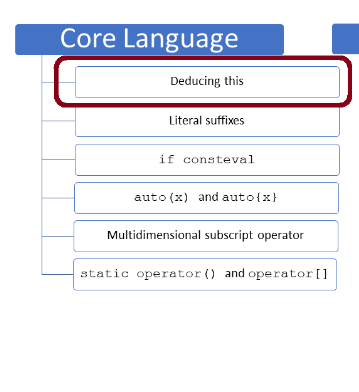 Anyone who thinks a small C++ standard follows a significant C++ standard is wrong. C++23 provides powerful extensions to C++20. These extensions include the core language, particularly the standard library. Today, I present a small but very impactful feature of the core language: deducing this.
Anyone who thinks a small C++ standard follows a significant C++ standard is wrong. C++23 provides powerful extensions to C++20. These extensions include the core language, particularly the standard library. Today, I present a small but very impactful feature of the core language: deducing this. In the 2023 Annual C++ Developer Survey conducted by the C++ Foundation, the community identified a number of major pain points when working with C++.
In the 2023 Annual C++ Developer Survey conducted by the C++ Foundation, the community identified a number of major pain points when working with C++. Question from reddit poster: I am preparing to release a new feature, a fat pointer class (virtual_ptr), that makes method dispatch even more efficient. Dispatching a method with one virtual argument via a virtual_ptr takes only three instructions and two independent memory reads. As an interesting side-effect, it is now possible to use YOMM2 with non polymorphic classes hierarchies.
Question from reddit poster: I am preparing to release a new feature, a fat pointer class (virtual_ptr), that makes method dispatch even more efficient. Dispatching a method with one virtual argument via a virtual_ptr takes only three instructions and two independent memory reads. As an interesting side-effect, it is now possible to use YOMM2 with non polymorphic classes hierarchies.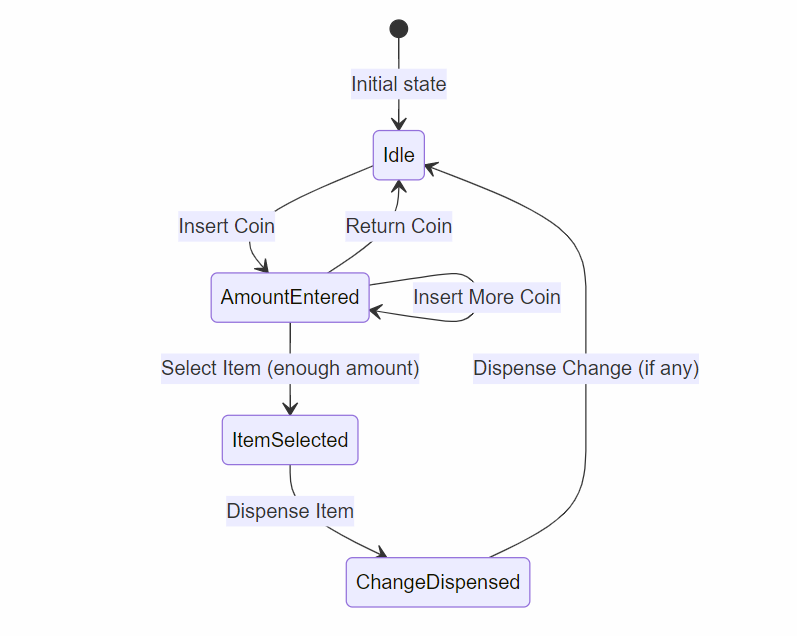
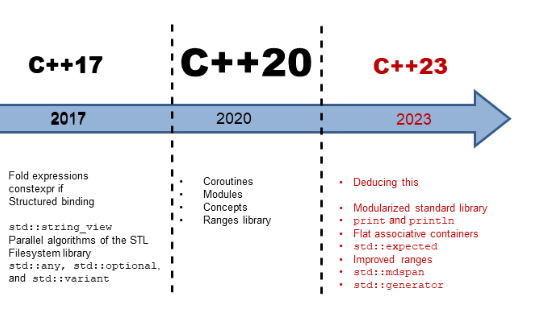 C++23 will be the next C++ standard after C++20. This new standard significantly improves C++ but is less game-changing than C++98, C++11, or C++20. C++23 is more in the tradition of C++17.
C++23 will be the next C++ standard after C++20. This new standard significantly improves C++ but is less game-changing than C++98, C++11, or C++20. C++23 is more in the tradition of C++17. Sometimes you want to add an implicit conversion to a type. This can be done by adding an implicit conversion operator. For example,
Sometimes you want to add an implicit conversion to a type. This can be done by adding an implicit conversion operator. For example, 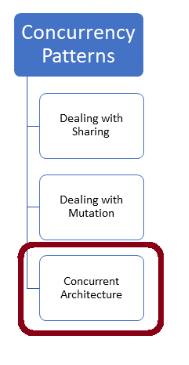 In my last post "Monitor Object" I implemented a thread-safe queue. I made two serious errors. Sorry. Today, I will fix these issues.
In my last post "Monitor Object" I implemented a thread-safe queue. I made two serious errors. Sorry. Today, I will fix these issues.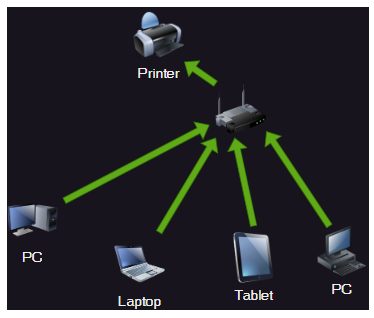 This article goes over the spicy topic of object ownership. We covered the lifetime quirks, and we found out that manual memory management can be a nightmare, we
This article goes over the spicy topic of object ownership. We covered the lifetime quirks, and we found out that manual memory management can be a nightmare, we